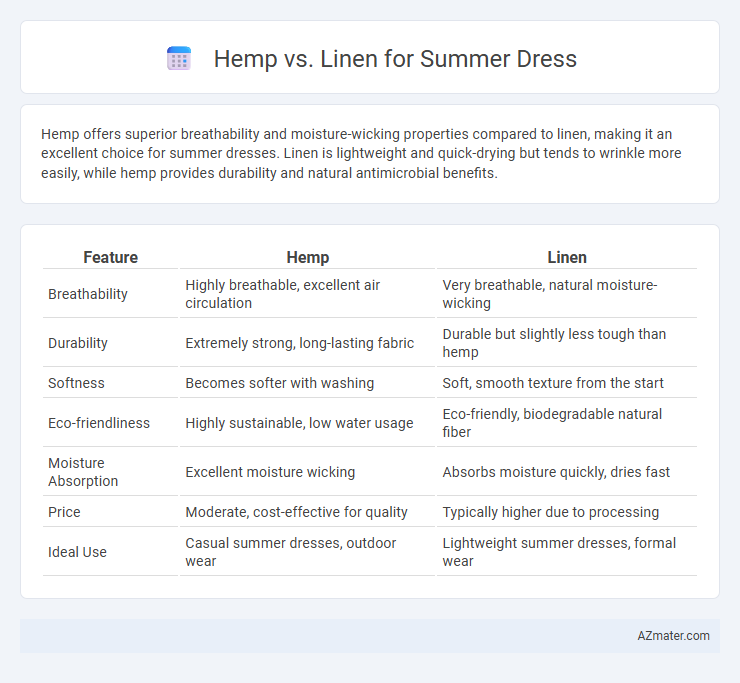Hemp offers superior breathability and moisture-wicking properties compared to linen, making it an excellent choice for summer dresses. Linen is lightweight and quick-drying but tends to wrinkle more easily, while hemp provides durability and natural antimicrobial benefits.
Table of Comparison
| Feature | Hemp | Linen |
|---|---|---|
| Breathability | Highly breathable, excellent air circulation | Very breathable, natural moisture-wicking |
| Durability | Extremely strong, long-lasting fabric | Durable but slightly less tough than hemp |
| Softness | Becomes softer with washing | Soft, smooth texture from the start |
| Eco-friendliness | Highly sustainable, low water usage | Eco-friendly, biodegradable natural fiber |
| Moisture Absorption | Excellent moisture wicking | Absorbs moisture quickly, dries fast |
| Price | Moderate, cost-effective for quality | Typically higher due to processing |
| Ideal Use | Casual summer dresses, outdoor wear | Lightweight summer dresses, formal wear |
Introduction: Why Choose Natural Fabrics for Summer?
Natural fabrics like hemp and linen are prized for their breathability and moisture-wicking properties, making them ideal choices for summer dresses. Both materials offer exceptional durability and a lightweight feel that helps keep the body cool in hot weather. Hemp and linen also provide eco-friendly benefits, supporting sustainable fashion by using renewable resources with minimal environmental impact.
What Is Hemp Fabric? Key Features Explained
Hemp fabric, derived from the fibers of the Cannabis sativa plant, is renowned for its durability, breathability, and natural resistance to mold and UV rays, making it an excellent choice for summer dresses. Its moisture-wicking properties keep the skin dry and cool, while the fabric softens with each wash without losing strength. Unlike linen, hemp offers superior tensile strength and eco-friendly cultivation, requiring less water and pesticides, promoting sustainable fashion choices.
Understanding Linen: Origins and Characteristics
Linen, derived from the flax plant, has been prized for its breathability, moisture-wicking properties, and lightweight texture, making it ideal for summer dresses. Its natural fibers are strong yet soft, offering durability alongside a crisp, elegant drape that enhances comfort in hot weather. The fabric's ability to regulate temperature and resist bacterial growth further distinguishes linen as a top choice for warm climates.
Breathability Showdown: Hemp vs Linen
Hemp and linen both offer exceptional breathability, making them ideal for summer dresses that keep you cool. Hemp fibers are naturally porous, allowing superior air circulation and moisture-wicking properties that help regulate body temperature. Linen, derived from flax plants, excels in lightweight texture and high moisture absorption, ensuring enhanced airflow and comfort during hot weather.
Comfort and Feel: Which Fabric Wins?
Hemp offers exceptional breathability and moisture-wicking properties, making it ideal for hot summer days, while its natural rough texture softens significantly after multiple washes for added comfort. Linen, derived from flax fibers, is renowned for its lightweight, smooth feel and excellent airflow, providing a cool, crisp sensation against the skin. When comparing comfort and feel for summer dresses, linen often wins due to its softer initial texture, though hemp's durability and evolving softness present a strong, breathable alternative.
Durability and Longevity Comparison
Hemp fabric offers superior durability and resistance to wear compared to linen, making it ideal for long-lasting summer dresses that withstand frequent washing and sun exposure. Hemp fibers are stronger and less prone to tearing or stretching, ensuring a garment maintains its shape and integrity over time. Linen, while breathable and comfortable, tends to weaken faster with repeated use and requires more delicate care to preserve its lifespan.
Sustainability and Eco-Friendliness
Hemp fibers require significantly less water and pesticides compared to linen, making hemp a more sustainable choice for summer dresses. Both hemp and linen are biodegradable and breathable, but hemp's rapid growth cycle and ability to improve soil health enhance its eco-friendliness. Choosing hemp over linen reduces environmental impact through lower resource consumption and supports sustainable agriculture practices.
Style and Fashion Versatility for Summer Dresses
Hemp fabric offers a natural, textured look with excellent breathability, making it ideal for casual summer dresses with a rustic, eco-friendly appeal, while linen boasts a smooth, lightweight weave that complements both casual and elegant summer styles. Linen's ability to absorb moisture and its soft drape enhance comfort and sophistication, facilitating versatile designs from flowy maxi dresses to structured shirt dresses. Combining durability with a refined aesthetic, both hemp and linen provide sustainable options, but linen's superior softness and varied textures elevate fashion versatility for stylish summer attire.
Care and Maintenance: Hemp vs Linen
Hemp fabric offers superior durability and becomes softer with each wash, making it ideal for long-term summer dress use while requiring minimal care such as gentle machine washing in cold water and air drying to maintain its texture. Linen, on the other hand, demands more delicate handling, often necessitating hand washing or gentle machine cycles to prevent fiber weakening and frequent ironing to avoid wrinkles. Both natural fibers are breathable and moisture-wicking, but hemp's resilience leads to less frequent replacements compared to linen, which can degrade faster if not cared for properly.
Final Verdict: Which Fabric Is Better for Summer Dresses?
Hemp offers superior breathability, moisture-wicking, and durability, making it ideal for hot summer days. Linen provides a lightweight, soft texture with excellent airflow but tends to wrinkle more easily. For long-lasting, eco-friendly summer dresses, hemp is the better fabric choice.

Infographic: Hemp vs Linen for Summer Dress
 azmater.com
azmater.com